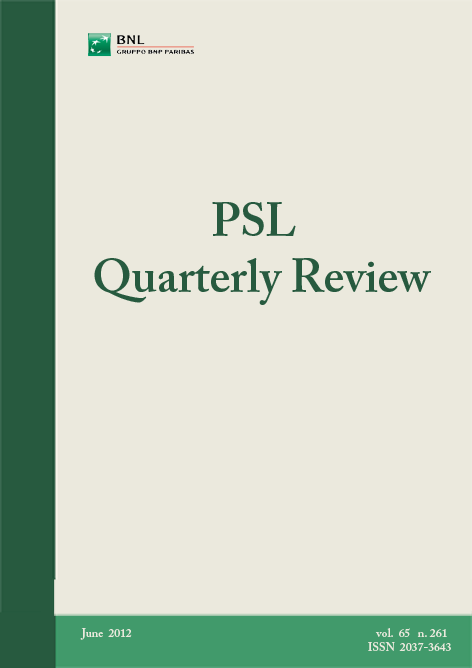Josef Steindl, the Trieste School and the BNL Quarterly Review
DOI:
https://doi.org/10.13133/2037-3643/10093Keywords:
Joseph Steindl, trade cycle, oligopoly, technical changeAbstract
The paper provides an introduction to the special issue in honour of Josef Steindl (1912-1993) celebrating the centennial anniversary of his birth. Steindl contributed to the theory of the firm, applying a stochastic methodology to study firms’ growth and their distribution by size; to the analysis of technology and education, stressing among other things the link between technical progress and skilled manpower requirements; to growth and business cycle theory, connecting the basic idea of a tendency to stagnation in a capitalist economy to Keynesian-Kaleckian macroeconomics and to a post-Keynesian theory of income distribution where investments determine profits; to the analysis of personal income distribution through the use of stochastic processes, with a critique of the traditional mainstream interpretation of the so-called Pareto Law. Behind all this, there was a general vision of the economy and society in which history, institutions and social tensions all played a central role. Relying on all this, there was a constant flow of applied analyses, always rich in intuition, aimed at understanding the real world so as to be able to better intervene in it in support of human progress.
JEL Codes: B31, O40, E32, O33
References
CORSI M. (2012), “Steindl on Stochastic Processes”, PSL Quarterly Review, vol. 65 n. 261, pp. 151-166.
GUGER A. and WALTERSKIRCHEN E. (2012), “Josef Steindl’s Life and Work in Austria”, PSL Quarterly Review, vol. 65 n. 261, pp. 135-149.
RONCAGLIA A. (1994), “Josef Steindl’s Relations to Italian Economics”, Review of Political Economy, vol. 6 n. 4, pp. 450-458.
ROTHSCHILD K. (2012), “Roots – Reflections on Josef Steindl’s First Article in an Economic Journal”, PSL Quarterly Review, vol. 65 n. 261, pp. 117-133.
SHAPIRO N. (2012), “Josef Steindl: An Economist of His Times”, PSL Quarterly Review, vol. 65 n. 261, pp. 167-187.
STEINDL J. (1952), Maturity and Stagnation in American Capitalism, Oxford: Blackwell.
STEINDL J. (1981), “Ideas and Concepts of Long Run Growth”, Banca Nazionale del Lavoro Quarterly Review, vol. 34 n. 136, pp. 35-48.
STEINDL J. (1982), “The Role of Household Saving in the Modern Economy”, Banca Nazionale del Lavoro Quarterly Review, vol. 35 n. 140, pp. 69-88.
STEINDL J. (1983), “The Control of the Economy”, Banca Nazionale del Lavoro Quarterly Review, vol. 36 n. 146, pp. 235-248.
STEINDL J. (1984), “Reflections on the Present State of Economics”, Banca Nazionale del Lavoro Quarterly Review, vol. 37 n. 148, pp. 3-14; reprinted in this volume, pp. 199-212.
STEINDL J. (1985), “Structural Problems of the Crisis”, Banca Nazionale del Lavoro Quarterly Review, vol. 38 n. 154, pp. 223-232.
STEINDL J. (1990), “Relaxing the International Constraints on Full Employment: A Comment”, Banca Nazionale del Lavoro Quarterly Review , vol. 43 n. 172, pp. 63-67.
STEINDL J. (1990), “Capital Gains, Pension Funds and the Low Saving Ratio in the United States”, Banca Nazionale del Lavoro Quarterly Review, vol. 43 n. 173, pp. 165-177.
STEINDL J. (1990), Economic Papers 1941-88, London: Macmillan.
STEINDL J. (1998), “Capital Gains in Economic Theory and National Accounting”, Banca Nazionale del Lavoro Quarterly Review, vol. 51 n. 207, pp. 435-449.
STEINDL J. (2012), “Effective Demand in the Short and in the Long Run”, PSL Quarterly Review, vol. 65 n. 261, pp. 189-197.
SYLOS LABINI P. (1979), “Prices and Income Distribution in Manufacturing Industry”, Journal of Post Keynesian Economics, vol. 2 n. 1, pp. 3-25.
Downloads
How to Cite
Issue
Section
License



